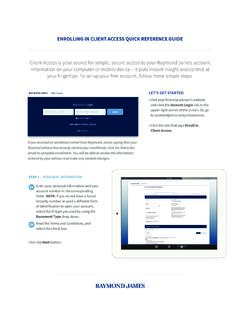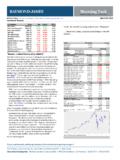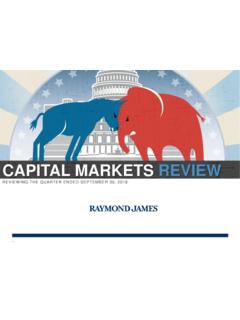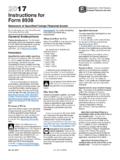Transcription of Taxation of Trusts and Estates - Raymond James Financial
1 Nicholson Financial Services, S. NicholsonFinancial Advisor89 Access RoadSte. CNorwood, MA of Trusts and EstatesJanuary 10, 2020 Taxation of Trusts and EstatesJanuary 10, 2020 What is Taxation of Trusts and Estates ?A trust is created when you (the grantor) transfer property to a trustee for the benefit of a third person (the beneficiary). An estateis the assets and liabilities left by a person at death. Both a trust and an estate are separate, legal, taxpaying entities, just like anyindividual. Income earned by the trust or estate property ( , rents collected from real estate) is income earned by the trust questions necessarily arise out of these situations. Is the transfer of property to a trust a taxable event subject to transfertaxes? And how is the income earned by the trust or estate treated for income tax purposes?Transfer taxesTransfer taxesrefer to excise taxes that may be imposed when you transfer property to another, either by gift during life or bybequest at , property transferred to a trust during life may be subject to generation-skipping transfer taxes and/or gift taxes.
2 In thiscase, Federal form 709--United States Gift (and Generation-Skipping Transfer) Tax Return--must be filed by the donor ( , thetransferor or the person funding the trust). Additionally, under certain circumstances, trust property may be included in adecedent's estate for estate tax purposes. In this case, Federal form 706--United States Estate (and Generation-SkippingTransfer) Tax Return--must be filed by the estate Taxation of trustsProperty in a trust generally earns income. How thatincome is taxeddepends on who receives it or whether the grantor orpowerholder (someone who holds a general power of appointment over the trust assets; , someone who has the right to saywho gets them) has retained an interest in the trust. Income retained by the trust--Generally, Trusts are "pass-through entities." This means that trust income retained by the trustis taxed to the trust (but not if it is a charitable remainder trust), while distributed income is taxed to the beneficiary whoreceives it.
3 In general, Trusts are taxed like individuals for income tax purposes. General tax principles that apply toindividuals also apply to Trusts . A trust may earn tax-exempt income and may deduct expenses. Trusts are also allowed asmall exemption. Income taxed to a trust is reported on Federal form 1041 ( Income Tax Return for Estates and Trusts ).Federal form 1041 is called a fiduciary income tax return because the trustee ( , the fiduciary) is responsible for filing itand for paying any taxes owed. Income distributed to beneficiaries--Income distributed by a trust is taxed to the beneficiary who receives it. The income is"passed through" on Federal form 1041 , Schedule K-1 (Beneficiary's Share of Income, Deductions, Credits, etc.). Thebeneficiary must report his or her share of the trust's taxable income on his or her personal income tax return (Federal Form1040).
4 Retained interest Trusts --Trust income is taxable to the grantor or powerholder if the grantor has retained an interest in thetrust ( , right of revocation) or if some other person is given a general power of appointment over the trust income orprincipal. Income taxable to the grantor or powerholder is not reported on Federal form 1041 ; rather, it is reported on thegrantor or powerholder's personal income tax return (Federal form 1040). Then, either a copy of Federal form 1040 isattached to a blank Federal form 1041 , or, in some circumstances, no Federal form 1041 is filed at Taxation of estatesAn estate may receive or earn income. How it is taxed depends on the nature of the income. Income earned prior to death--If a decedent was a cash method taxpayer, income received (actually or constructively) by thedecedent prior to death is reported on thedecedent's final 1040.
5 If the decedent was an accrual taxpayer, income accruedprior to death is reported on the final earned by the taxpayer but not paid before death is reported on the income tax return of the recipient of the income. Thisis calledincome in respect of the decedent (IRD). Examples of IRD include uncollected wages, accrued interest on bankaccounts, and dividends declared but not collected. If the recipient of IRD is the decedent's estate, it is reported on Federal FormPage 2 of 4, see disclaimer on final pageJanuary 10, 20201041 (the fiduciary tax return) by the estate representative. If the recipient is an estate beneficiary, it is reported on Federal Form1041, Schedule B, and on the beneficiary's personal income tax return, Federal form 1040. Income earned after death--Income earned by estate property after death is reported either on the estate's tax return(Federal form 1041 ) or on the tax returns of the beneficiaries who receive the property directly from the decedent (FederalForm 1040).
6 Some facts about filing fiduciary income tax returnsTax yearA trust must use the calendar year ending December 31. An estate canchoose a fiscal identification numberAny trust required to file Federal form 1041 (except for revocable or grantor-type Trusts ) must obtain a Taxpayer IdentificationNumber (TIN). A TIN for a decedent's estate is needed if the estate will earn any income or if the estate representative will file afiduciary income tax TIN applicant must: (1) apply using the revised form W-7, Application for IRS Individual Taxpayer Identification Number,and (2) attach a federal income tax return to the form W-7. Applicants who meet an exception to the requirement to file a taxreturn (see the instructions for form W-7) must provide documentation to support the your form W-7 and proof of identity documents to Internal Revenue Service, Austin Service Center, ITIN Operation, 149342, Austin, TX 78714-9342.
7 You may also apply using the services of an IRS-authorized Acceptance Agent or visit anIRS Taxpayer Assistance Center in lieu of mailing your information to the IRS in requirementsTrusts with any taxable income, Trusts with a nonresident alien beneficiary, and Trusts with gross income of $600 or more must fileFederal form form 1041 must be filed if the estate's gross income is $600 more or if one of its beneficiaries is a nonresident deadlineReturns for Trusts must be filed by April 15 of the year following the close of the tax for Estates must be filed by the 15th day of the 4th month of the year following the close of the tax year (remember, anestate can choose its fiscal year). So, if the close of the tax year is August 31, 2012, the return is due on December 15, extensionsFederal form 8736 extends the filing deadline for Trusts for three months.
8 An additional three-month extension may be grantedwith Federal form three-month extension may be granted to Estates by filing Federal form 2758. An additional three-month extension may begranted with a second Federal form late-filing penalty of 5 percent of tax per month will be imposed (up to a maximum of 25 percent). This penalty is in addition toany late-payment 3 of 4, see disclaimer on final pageNicholson Financial Services, S. NicholsonFinancial Advisor89 Access RoadSte. CNorwood, MA 10, 2020 Prepared by Broadridge Investor Communication Solutions, Inc. Copyright 2020 Please contact Branch Ads Supervision to obtain the appropriate Raymond James 4 of 4












